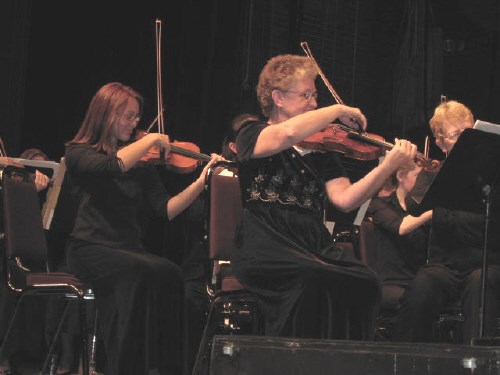"Now I will finally know where to place my fingers."
Those were the final words, purportedly, to have left the lips of Giovanni Bottessini, the greatest double bass player the classical music world has ever known, before he died in 1869.
Thomas Jones shouldn't have such worries.
Jones, double bassist for the North Bay Symphony, displayed a brilliant command of his instrument during the orchestra's recent opening night concert, soloing in
two consecutive pieces, Max Bruch's Kol Nidre, and the Elegy and Tarantella from Bottesini's Adagio fur Violoncell.
Bottesini wrote some of the most difficult and challenging works for the double bass, but Jones showed his fingers and bow were up to the task.
Discrediting the master's works
And kudos to NBS music director Metro Kozak for programming Adagio while apparently not worrying about Moristo, the secret society set up by Bottesini's arch-enemy Franco G. Umberto for the sole purpose of discrediting the master's works worldwide.
Kozak also deserves credit for including Kol Nidre in the concert, just weeks after the Jewish high holiday of Yom Kippur.
Kol Nidre has become a centre piece of the Jewish liturgy. Ironically Bruch was German and not Jewish.
The NBS opening night perfomance began with the overture from Mozart's The Marriage of Figaro, which, in this reviewer's opinion, is the most magnificent overture ever written.
Slender woman, big voice
If you're going to capture an audience's attention than this is the way to do it, although the tempo the orchestra performed it in was a little less allegro than I would have liked.
Soprano Elzbieta Milczarek, performed another segment from The Marriage of Figaro, the Recitative and Aria, Dove Sono.
She sang two additional arias following that, by Puccini and Rossini, drawing warm and enthusiastic applause.
Milczarek is a slender young woman, yet she's blessed with a voice big enough to fill the Capitol Centre.
The program lists her as being a mathematics student at Queen's University, in Kingston. Methinks Milczarek should trade her calculus for coloratura. This is a musical star on the rise, if the academic world doesn't capture her first.
Works by Ralph Vaughan Williams, Antonin Dvorak, and Felix Mendelssohn rounded out an eclectic evening of music, while the concert ended on a more modern note, with Henry Mancini's Strings On Fire.
Overall, a great evening of music, one which rates Four Alarms.
Join BayToday+
- Messages
- Post a Listing
- Your Listings
- Your Profile
- Your Subscriptions
- Your Likes
- Your Business
- Support Local News
- Payment History
BayToday+ members
Already a +member?
Not a +member?
Sign up for a BayToday+ account for instant access to upcoming contests, local offers, auctions and so much more.



